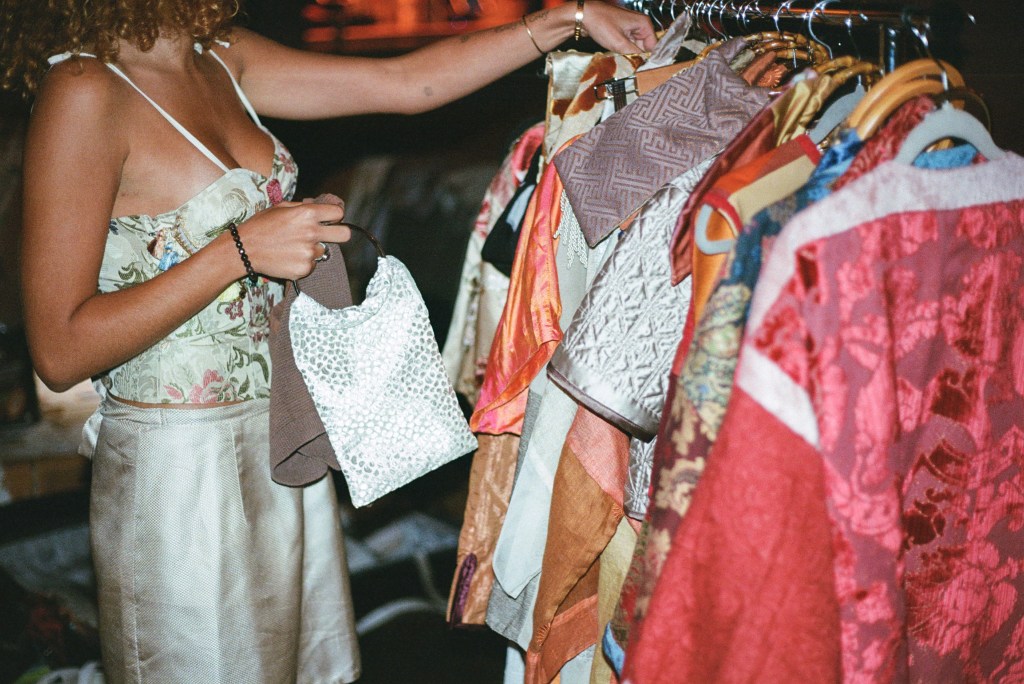Here’s a fashion rental startup with a twist: London, U.K.-based Curated Loop — which soft-launched a high-end fashion rental marketplace last week after bootstrapping to launch an MVP — is sourcing statement pieces from independent designers’ sample stock to style itself as an edgier alternative to more conventional rivals.
Its approach means items available for rent on its marketplace may be literal one-offs (samples), or come from an indie designer’s prior season’s collection (aka, dead stock) or otherwise ‘stand-out’ in the sense that you won’t be able to source these garments in high street stores — or even, the startup’s co-founders contend, on other fashion rental platforms. So the promise is access to unique high-end designs.
The startup argues there’s a gap for a luxury fashion rental marketplace focused on emerging independent designers and the cutting edge looks they’re stitching — which, on its marketplace, translates into a selection of bold pieces (and suggested outfits) picked to catch the eye of its target style-seeking young urban demographic (see, for example, this leather-look corset top — paired in one of its styling shots with bold-printed baggy ‘boyfriend’ jeans: £46.60 to rent the look).
Curated Loop is calculating that its target users might be looking for a high-end outfit for special events (parties, job interviews, ski holidays etc) but also as statement daywear (perhaps to spice up their Instagram feed) — or even for ‘date-wear’ (it’s working on a Valentine’s Day tie-up with a dating app).
Changing the economics of wearing a designer outfit opens up a whole new set of opportunities for dressing up, especially for budget-conscious younger shoppers who seem increasingly comfortable giving fashion rentals a whirl — fuelled by concern over the environmental and ethical costs of fast fashion.
The U.K. has seen a blossoming in fashion rental startups in recent years, with the likes of Hurr (founded 2017), Hirestreet (2018), My Wardrobe HQ (2019), By Rotation (2019) and Rotaro (2019) popping up to offer fashion-conscious consumers a more sustainable way to stay on trend by renting high end.
Some high street clothes retailers have also got into the rentals game. So there’s competition aplenty — and, for new founders seeking an ‘in’, that means they face the age-old challenge of standing out in a crowd.
Curated Loop’s co-founders, Anna Caldana and Rachel Mcluckie, bring a background in (and passion for) fashion to what they hope will be badged as a fresh approach to designer rentals. They’re drawing on their own industry contacts, plus years of scouting for fresh design talent by scouring the pages of fashion magazines, to amass a database of indie labels they want to bag for their curated marketplace. (The business model they’re starting with is a per transaction fee but they say they plan to develop the model as they grow.)
Mcluckie describes the look they’re going for with their garment picks as “eclectic, city, cool, definitely unique” — arguing: “It’s got an edge to it over our competitors.”
Existing (non-P2P) fashion rental platforms had failed to impress the two co-founders with a more conventional (and/or cautious) approach to the clothes they ranged for rent. “Both of us felt we would go onto rental sites and it was all quite similar — specific wedding events [etc]… it definitely has a kind of tone,” Mcluckie suggests. “And I think that doesn’t necessarily align with Anna and I, what we were after in the market.”
Feeling an itch for edgier stuff to rent, the pair got together to establish Curated Loop last year.
Mcluckie previously founded a subscription-based peer-to-peer fashion rental startup, at the start of 2019, with the idea of getting users renting out their own wardrobes (à la By Rotation and others). But her earlier startup had a focus on live events — which the pandemic quickly put paid to — hence she began casting around for other business ideas in fashion. Then, with her friend Caldana on board, the pair hit on offering a curated pick of indie designer garments and building a marketplace that aims to cater to the needs of up-and-coming designers — helping them build brand awareness while generating a passive income by renting out stock that might otherwise be sitting in a warehouse gathering dust. (Or, even worse, tossed into landfill.)
“We wanted to create a product that felt modern, inclusive and elevated in line with our target audience of Gen Z and millennials,” Caldana tells us. “That’s why it was really important for us to launch with a mobile (as well as desktop) platform. It’s very intuitive and we have plans to build out gamifications to keep our Gen Z’s engaged.”

As well as mining their contacts books and attending fashion shows to source new designer talent, Curated Loop is working on establishing an ongoing partnership with the arts-focused London’s Central Sant Martins University — so it’s positioning itself to spot (and support) emerging talent at the student designer stage.
“I’ve been in the industry for over ten years… Anna[‘s] worked with independent designers forever. And I think that is definitely our strength,” adds Mcluckie in a video call with TechCrunch to dig into their approach. “We have got an immediate network but we also have a kind of peripheral network of designers — we’ve been able to go to fashion weeks, we’ve got a nice connection with Central Sant Martins. It’s really sort of building out that network — and that network effect to grow the customer and designer base.”
As with other fashion rental startups Curated Loop hinges on leaning into circularity — as an opportunity to sell the user on a way to expand their wardrobe (more) sustainably — and without having to invest huge sums of money to buy new clothes. Per the website, the cost of a Curated Loop rental starts at a tenth of the (listed) RRP of each garment. A savvy bit of product marketing that packages the price as a bargain by default.
On the sustainability side, they argue their focus on designer samples and dead stock helps reduce textile waste — a high percentage of which they say comes from prototyping and sampling.
Still, fashion rentals aren’t guilt free; they do entail a lot more shipping and cleaning than a garment might otherwise get if it stayed with one careful owner — so there are environmental costs to this kind of fashion-driven consumption.
To help with that, another of Curated Loop’s partnership is with London-based eco laundry startup, Oxwash, which does dry cleaning without solvents and uses e-bikes and electric vehicles for pick-ups to minimize carbon emissions. But the pair say they hope to do more on the emissions shrinking/offsetting front as the business develops.
“We’re obviously not in the business of greenwashing and we understand that there are emissions associated with shipping — so it’s something we are really focused on,” says Mcluckie. “The beauty of also starting a company from afresh is you can put those circular practices and plans in to begin with.”
As noted above, Curated Loop’s target customer is urban and on the younger side (Alpha, Gen Z, Millennials etc) — so brands are chosen for their likely style appeal to this demographic. And while there is a limited number of labels on the platform at launch the co-founders tout a pipeline of designers they’re working to add as they seek to expand the collection and scale rentals. Asked what they’re aiming for, Mcluckie says they have a rough target of hitting at least a couple of thousand rentals per month by the end of their first year running.
The choice to offer a curated edit of brands and unique pieces is not only a way to appeal to a fashion-forward, self-brand-building youth demographic that wants to wear stuff that helps them stand out (not blend in), it’s also a conscious strategy to attract more indie designers into the marketplace — with the pair suggesting up-and-coming designers will feel more comfortable showcasing their designs in a carefully curated digital space where they’re not being ranged alongside lower end and/or more conventional styles that could pose a perception risk to the brands these indie fashion labels are also working hard to establish.
“When we started speaking to designers we [identified] certain issues — we had designers [tell us] ‘we’re not happy in the platform I am right now, on the rental side, because I don’t know that I align with the rest of the designers on the platform’,” explains Caldana. “So that was one of the reasons why we decided to do this curated selection of designers — and emerging, independent and sustainable. Because we wanted to have every designer on our platform happy with the aesthetic their designs were sitting next to.”
Garments available to rent on Curated Loop’s edited marketplace run the gamut from dresses and skirts to tops, jeans, jackets and suits — and also span a range of price-points (with rentals available from £200+ at the high end to just over a tenner at the bottom).

Some of the items available at launch include this Custom Tapestry corset (listed as RRP: £350; the rental price is from £35 for four days); this Downfilled Ski Jacket with Hood (from £53.90 for four days’ rent); these Screen Printed Jeans (£35.40 for four days); and this Alba Candy Silk Dress (£120 for three days).
Currently all the stock is what would (classically) be labelled as ‘womenswear’ — but the founders say they’ll expand to offer ‘menswear’ soon too.
While there’s no option at present for Curated Loop users to pay to buy an item they’ve rented (i.e. if they’re really fallen in love with a piece), the startup says it’s working on adding the option for a user to pay to permanently add a rental to their wardrobe at a discount on its RRP.
They also suggest they may expand the platform to allow peer-to-peer rentals in future — which would mean letting Curated Loop users rent out their wardrobes to each other (which could, in turn, drive purchases of rental items once that’s opened up as savvy users might seek to cash in on popular pieces by buying them to rent to their peers). So there are concentric loops that can be hooked onto to amplify this kind of circular commerce.
If Curated Loop adds P2P rentals it would replicate the core offering of some of their more style-eclectic rivals (such as By Rotation) — so the gaps between startups in this space look set to blend further (if not entirely blur).
Potential fluidity around functionality puts a big focus on community building — and on pulling in a user-base that’s really engaged with and excited by what the platform offers them. So being able to serve up unique styles and looks (vs more conventional rental platforms) may help Curated Loop win over style-savvy users and turn them into loyal followers. Just so long as these cool kids dig its designer picks. So that means a lot rests on the co-founders’ style edit if they’re going to hit the sweet spot where every returned garment is circled smoothly and swiftly back into a fresh rental.
To this end, they note they’re focused on producing lifestyle content as part of the community building piece — emphasizing that their marketplace isn’t just going to dryly range inventory but will seek to serve users with advice and inspiration for putting together unique outfits and looks, and even offer access to events and third party partnerships (so, again, it’s picking up the baton of the traditional fashion mag to wrap glossily around the commerce component and, er, make everything more sticky).
Curated Loop is consciously labelling itself as a “fashion-tech” company. The plan is to build the MVP into a more fully featured product by adding things like gamification to drive engagement. But they’re also keeping a weather eye on whatever “web 3” might mean for youth fashion — whether that’s NFTs or some other form of tokenization (potentially tied to live events), or virtual clothes for dressing up avatars, or even “metaverse fashion weeks” (which is apparently a thing some folks in the fashion industry are working on making happen). So they’re shooting for the startup to be trend-led on the tech side too.
“We’ve not even dipped our toes [in web 3] but we’ve been to a few events. A lot of our friends are in that world,” notes Mcluckie, saying this emergent tech concept is an area they’re curious about right now — without being sure exactly what it may mean for the future of fashion. “It’s a really interesting space and I know at the moment it’s kind of gimmicky… ” she continues, before scattering a few more caveats about spending personal time on such stuff.
“But we know it’s probably going to be the future,” finishes Caldana, adding a little Gen Z conviction to Mcluckie’s Millennial ‘reserved judgement’ on metaverse.
So while the pair are currently (and for the near term) working with a tech agency, which built the MVP to their bootstring budget, the plan for later on is to take the tech piece in-house and build an engineering team so they can develop proprietary IP and reactively adapt the platform’s capabilities to mesh with howsoever tech intersects with fashion and/or reshapes demand for humans being stylish in the future.
Before then, the order of the day is more prosaic: Scaling usage of the marketplace by tapping up and into more networks (of designers and users), and working to get the word out in other ways, including reaching out to select social media influencers to raise some buzz.
The co-founders will also be looking to raise a seed round later this year — they say they’re targeting ~£300,000 — so they’ll be taking some time for fundraising over the coming months. And if all goes to plan, they want to expand the service to other U.K. cities and also hope to launch into the European Union “soon”.
“We have a clear pipeline and roadmap for growth, and our seed investment will help us achieve this,” they suggest, adding: “We have a number of ongoing conversations with early stage investors as well as Angels, it’s obviously so important to find the right fit for the business. We had an offer from an oversees Investor pre-launch but knew it wasn’t the right step for our business at that moment. Through (a lot) of hard work and determination we self funded our MVP and now can’t wait to start scaling!”
London’s By Rotation is taking its P2P fashion rental app stateside






























Comment